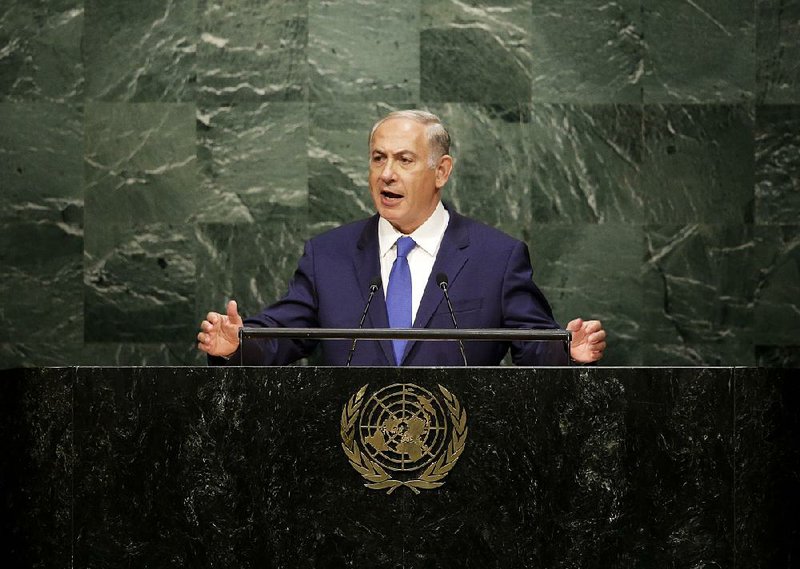UNITED NATIONS -- Israeli Prime Minister Benjamin Netanyahu said Thursday that he is prepared to have direct talks with Palestinians without preconditions and warned that the recent nuclear deal between Iran and world powers makes war more likely.
The bulk of Netanyahu's 40-minute speech to the U.N. General Assembly was spent on the nuclear agreement and the regional threat posed by Iran.
The Israeli leader asked the member states of the General Assembly, most of which have congratulated the negotiating parties on the deal reached in July, to check their enthusiasm for the agreement at the door.
Netanyahu said Iran is financing dozens of terrorist cells around the world and that the deal will not turn a "rapacious tiger into a kitten."
"Just imagine what Iran will do after those sanctions are lifted, unleashed and unmuzzled," he said. "Iran will go on the prowl, devouring more and more prey."
"Does anyone seriously believe flooding a radical theocracy with weapons and cash will curb its appetite for aggression?" Netanyahu asked. "Do any of you really believe a theocratic Iran with sharper claws and sharper fangs will be more likely to change its stripes?"
The Israeli prime minister spoke directly to the Iranian leadership, after citing a series of quotations from Iranians predicting the eventual demise of the Jewish state: "Your plan to destroy Israel will fail," Netanyahu said. "Israel will not permit any force on Earth to threaten its future."
On Wednesday, Palestinian Authority President Mahmoud Abbas stood at the same podium and accused Israel of scuttling peace prospects through settlement growth and other policies. Netanyahu said it was the Palestinians who were recalcitrant, and he repeated calls to resume peace talks, which collapsed in 2014.
"I am prepared to immediately resume direct peace negotiations with the Palestinian Authority without any preconditions whatsoever," he said.
Palestinians said they will not resume talks until Netanyahu's government curtails the expansion of Jewish settlements in the West Bank and agrees that the talks about the borders of a future Palestinian state be based on the 1967 armistice lines.
Chief Palestinian negotiator Saeb Erekat has said, "There is no reason to talk just to talk." He said what Israel calls "preconditions" are, in fact, parameters for negotiations. After the collapse of last year's U.S.-led talks, Palestinian leaders have been vocal in their belief that Netanyahu will never agree to a Palestinian state and that offers of "talks without preconditions" are a ruse.
Some of the skepticism is shared by the White House. On the eve of his re-election earlier this year, Netanyahu promised voters that there would be no Palestinian state on his watch. He later amended his remarks to say that the time is not right. President Barack Obama suggested in an interview that he took Netanyahu at his word.
At the U.N., Netanyahu went out of his way to praise the support the United States has long given Israel.
"We will never forget that the most important partner Israel has, has always been and will always be the United States of America," Netanyahu said. "The alliance between Israel and the United States is unshakable."
Netanyahu also chastised the U.N. for what he characterized as excessive hostility toward Israel.
Evoking the Holocaust, he said, "Seventy-five years after the murder of 5 million Jews, Iran pledged to murder my people. And the response from this body, from nearly every one of the governments here, has been absolutely nothing. Utter silence. Deafening silence."
Then he paused for several seconds, looking out at the members seated in the Assembly Hall, his visage grim as he returned to the theme of Iran. "If Iran's leaders were working to destroy your country, perhaps you'd be less enthusiastic about the deal," he said.
He concluded by warning that Iran is a threat not only to Israel but to the entire world.
"Stand with Israel, because Israel is not just defending itself," he said. "More than ever, Israel is defending you."
A Section on 10/02/2015

